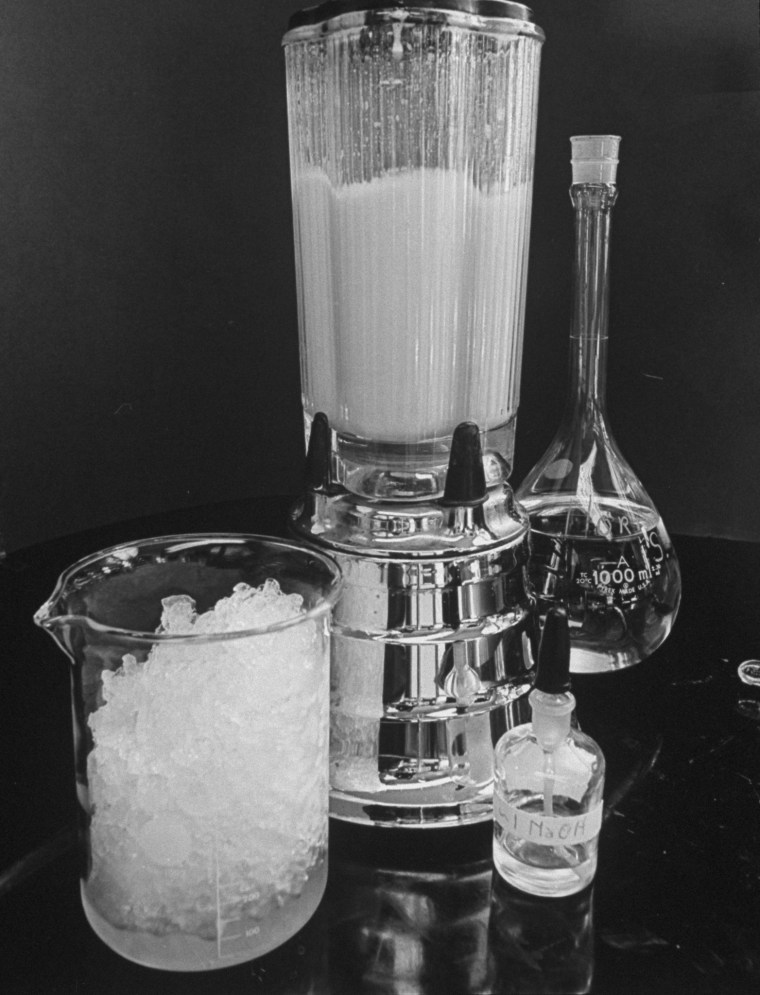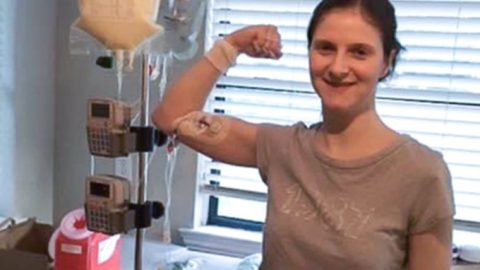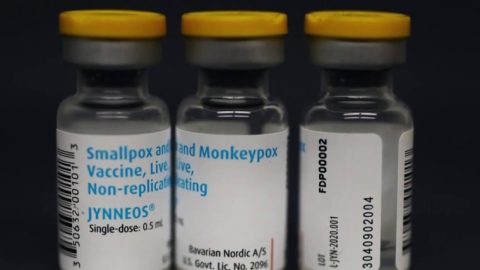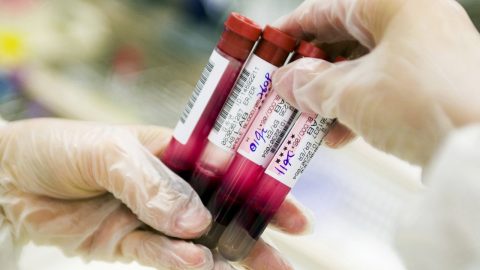Five patients in the United Kingdom have developed Alzheimer’s disease that appears to be the result of contaminated injections they received as children decades ago, according to a new study that could change the way scientists think about the causes of dementia — and cause anxiety in patients who underwent the same therapy.
All five patients received injections of human growth hormone from cadavers for several years as a treatment for very short stature, according to the study, which was published Monday in the journal Nature Medicine. Scientists extracted the hormone from the cadavers’ pituitary glands, located at the base of the brain.
What the scientists didn’t realize at the time, however, was that in some cases, another substance was extracted as well, contaminating the batches: amyloid-beta protein. This protein is involved in the formation of the hallmark brain plaques seen in Alzheimer’s. Researchers said they can’t fully explain how being exposed to these proteins could trigger the creation of plaques and tangles in the brain that cause Alzheimer’s disease.

Alzheimer’s cases are generally divided into two main groups: cases caused by genetic mutations and those that develop sporadically in the population in people over 65 due to a number of risk factors, such as smoking, obesity and high blood pressure.
The patients in the new study didn’t fit into those two groups. They developed dementia symptoms between ages 38 and 55. None had genetic mutations linked to early-onset dementia, the study found.
The study authors said their findings suggest a possible third way for Alzheimer’s to develop: through contaminated medical products.
Some doctors who regularly treat children for hormone-related issues and who were not involved with the research said they were surprised by the findings.
“This is new information that is not known by the medical community,” said Dr. Kupper Wintergerst, who chairs the American Academy of Pediatrics’ section on endocrinology.
Other doctors said they were concerned that a therapy once regarded as safe has caused so much harm.
“To hear that Alzheimer’s is linked to a medical treatment, that’s disturbing,” said Dr. Dennis Chia, an associate clinical professor of pediatric endocrinology at the David Geffen School of Medicine at UCLA.
Christopher Weber, director of global science initiatives at the Alzheimer’s Association, noted that the study was very small. The findings would be more credible if other scientists get similar results in future studies.
Weber said there’s no risk to the general public.
“Alzheimer’s disease is not contagious,” said Weber, who was not involved in the new study. “You can’t catch Alzheimer’s by taking care of someone with Alzheimer’s. Alzheimer’s disease is not transmissible through the air, or by touching or being near someone with Alzheimer’s.”
Still, he said the study’s findings weren’t entirely new.
“We’ve known for a long time that it is possible to create abnormal amyloid buildup — similar to that seen in Alzheimer’s — in the brain of an animal by injecting it with amyloid-beta,” Weber said. “We also transfer human Alzheimer’s genes into animals to initiate abnormal, Alzheimer’s-like processes in their brains.”
Cadaver-derived growth hormone was given to 27,000 children worldwide from 1959 to 1985, according to the new study, including about 7,700 patients in the United States. Doctors used hormones taken from cadavers before a synthetic version became available.
It’s possible that other patients who received cadaver-derived hormones are at higher risk of Alzheimer’s, the study authors said. But they added that they don’t expect to see a huge wave of cases.
“The actual risk of transmission of Alzheimer’s disease in this context is really very low and these are probably going to be very rare cases,” lead study author Dr. John Collinge, a neurologist and the director of the University College London Institute of Prion Diseases, said at a news briefing Thursday.
Collinge said patients should be aware of the potential risk for Alzheimer’s and, if needed, seek out testing and treatment.
“It’s possible that if we catch people at an early stage” of Alzheimer’s, he said, “they may be more amenable to treatments that are becoming available.”
Children being treated for short stature today are not at risk, because doctors have used synthetic growth hormone since 1985.
“I don’t think people should be alarmed,” said Dr. Paul Kaplowitz, a professor emeritus at Children’s National Hospital who specialized in pediatric growth disorders.
Kaplowitz noted that U.S. manufacturers developed a safer way to purify cadaver-derived human growth hormone in 1977, significantly reducing the risk of contamination. Patients treated in the U.S. with cadaver-derived growth hormone after 1977 are likely at very low risk.
“You would have thought that if this were a big problem, we would have a lot of cases by now,” said Kaplowitz, who was not involved in the new study.
Another dangerous protein
Although Collinge and his team’s earlier research suggested that patients who received cadaver-derived growth hormone could be at risk for Alzheimer’s, they began following the patients because of concerns over a different disease: Creutzfeldt-Jakob disease, or CJD, a rare and deadly condition that also resulted from contaminated hormone samples.
CJD is a cousin of bovine spongiform encephalopathy, commonly called mad cow disease. More than 250 growth hormone patients have been diagnosed with CJD worldwide.
Doctors believe patients developed CJD because of hormone samples contaminated with prions — little-understood proteins that can trigger normal brain proteins to fold into abnormal shapes. Thirty-five patients treated with cadaver-derived human growth hormone in the U.S. have died from CJD.
For decades, people who had lived in or traveled to the U.K. or other places hit by mad cow disease were banned from donating blood, for fear of passing on the disease. The Food and Drug Administration lifted that ban in 2022.
Collinge said he doesn’t know whether the proteins that appear to have caused Alzheimer’s can be transmitted through blood transfusions or organ donations. A spokeswoman for the American Society of Transplantation said its scientists know of no links between organ transplants and a heightened risk for Alzheimer’s.
“It’s an interesting question,” Collinge said at the news briefing. “It’s not something we’ve looked at.”
Scientists have had evidence for some time that CJD can be transmitted through blood transfusions, and the American Red Cross bars people who received cadaver-derived growth hormone from donating blood.
But an American Red Cross spokesman said in a statement that “there is no scientific evidence” that donated blood can lead to an accumulation of amyloid protein in the body or increase the risk of Alzheimer’s. The Red Cross is in close contact with the FDA and other international health agencies that oversee blood safety to make sure its recommendations include the latest science, spokesman Daniel Parra said.
The new study raises questions about how Alzheimer’s begins. Alzheimer’s may have more in common with CJD than previously suspected, Collinge said.
“This may have important implications for understanding and treating Alzheimer’s disease in the future,” he said in a statement. While there have been no other reported cases of Alzheimer’s acquired through other medical care, the study “should lead us to review measures to prevent accidental transmission via other medical or surgical procedures in order to prevent such cases occurring in the future.”
For more information, patients treated with cadaver-derived human growth hormone in the U.S. can call the National Institute of Diabetes and Digestive and Kidney Diseases at 1-800-860-8747 or email healthinfo@niddk.nih.gov.
Patients treated in the U.K. can email the National Prion Clinic at uclh.prion.help@nhs.net.









Recent Comments